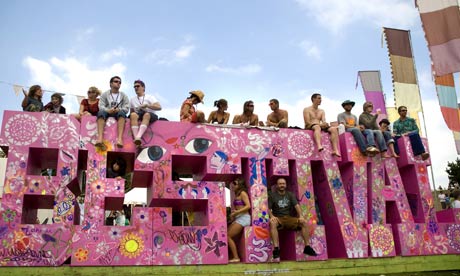10.10 carbon pledge
Two of the UK's biggest music events, with combined crowd of nearly 100,000, agree to cut carbon emissions by 10%
- The Observer, Sunday 25 October 2009

Bestival, on the Isle of Wight, will ask its visitors to come by public transport or share cars. Photograph: David Pearson/Rex Features
Nearly 100,000 music fans at two of the UK's biggest summer music festivals will be cheered to know that next year's pop-fuelled hedonism will come with a shrunken carbon footprint.
The Lovebox festival in London and Bestival on the Isle of Wight have both promised to join the 10:10 climate change campaign and cut their carbon emissions by 10%. Glastonbury – said to be Europe's largest music festival, with a crowd of 177,000 – is also considering coming on board.
The campaign, launched on 1 September, encourages people and organisations to cut their carbon footprints by 10% during 2010. It has nearly 38,000 individuals and more than 1,200 companies signed up, including Tottenham Hotspur football club, Adidas, Pret A Manger, Microsoft UK and O2 as well as 56 councils representing 10 million constituents. Franny Armstrong, director of the eco-documentary The Age of Stupid and founder of 10:10, welcomed the festivals' decision. "It's brilliant news that the big festivals will be cutting their emissions next year. Perhaps they could also agree to 10% less mud?" she said. 10:10 hopes to sign up all the major festivals by next summer.
Tom Findlay, one half of the dance music duo Groove Armada, which runs Lovebox, said the festival had always promoted social causes. "I was very fired up by the whole notion of the 10:10 campaign," he said. "You feel so powerless sometimes. I think it's important that people are empowered to feel that at home you can make a difference."
The festival has already started working out how to cut its emissions. "A lot of it is just enormous practical common sense," he said. "There is no one fundamentally brilliant idea to solve it." One idea is to improve transport logistics so that fewer trucks travel to the site. Lovebox is also looking into using solar-powered stages and water fountains to cut the number of water bottles used.
Other major recruits to the 10:10 campaign recently include the National Union of Teachers, the British High Commission in Nairobi, the British Embassy in Kuwait and the UK's largest sports charity, the Football Foundation.
Transport is a major contributor to festivals' carbon emissions, accounting for 68% of the sector's total – equivalent to around 57,000 tonnes of CO2. That makes a 10% cut harder for Lovebox, which is held in Victoria Park in east London, because 80-90% of people already travel to the site on foot or by public transport.
With many of Bestival's visitors driving to its site in a country park on the Isle of Wight, there is much more scope for cuts. "We will be looking to make emissions cuts in audience travel by creating incentives to use public transport," said Rob da Bank, a DJ and Bestival's promoter. Bestival will also encourage car-sharing and run more stages using solar power and local biofuels. It is also planning to increase recycling and composting of waste.
Glastonbury is also planning to change visitors' travel habits. "We're trying to to encourage people to car-share or travel by coach and rail because we're a greenfield festival and transport is the biggest part of our carbon footprint," said Lucy Brooking-Clark, its sustainability coordinator. The festival, which will be 40 years old next year, is also looking at anaerobic digesters that could turn food waste and sewage from both the festival and the farm which hosts it into a source of renewable electricity. Brooking-Clark said Glastonbury was still deciding whether to sign up to 10:10.
But cajoling festival visitors out of their cars may not be easy. A report this year by Julie's Bicycle, a non-profit organisation that advises the music industry on reducing its carbon emissions, warns that awareness of public transport options and transport's environmental impacts is "not sufficient motivation to change travel behaviour without incentives and disincentives".
Ben Challis, co-founder of A Greener Festival, which audited the environmental impact of 37 festivals this year, said transport was the key. "Electricity use, waste and the emissions from bands travelling are important, but the biggest footprint for any greenfield festival is travel by festival-goers. The problem in the UK is a lack of proper public transport infrastructure," he said.
Bestival was rated as "outstanding" last year by A Greener Festival for its efforts on sustainability.
A Liberal Democrat motion calling on the government to commit to a 10% cut in emissions from the public sector was narrowly defeated in the Commons last week.




/https%3A%2F%2Fassets.over-blog.com%2Ft%2Fcedistic%2Fcamera.png)
/https%3A%2F%2Fstorage.canalblog.com%2F93%2F67%2F300583%2F79583573_o.jpg)
/http%3A%2F%2Fstatic.guim.co.uk%2Fsys-images%2FGuardian%2FAbout%2FGeneral%2F2012%2F9%2F21%2F1348231350306%2FBig-picture-Spill-008.jpg)
/http%3A%2F%2Fstatic.guim.co.uk%2Fsys-images%2FGuardian%2FPix%2Fpictures%2F2012%2F2%2F27%2F1330343060996%2FDan-Lepard-byline-pic-003.jpg)